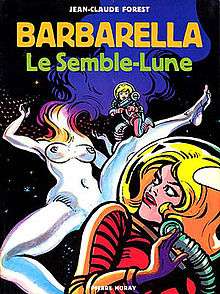Barbarella (comics)
| Barbarella | |||
|---|---|---|---|
 Barbarella le Semble-Lune (1977), published by Pierre Horay. Cover art by Jean-Claude Forest. | |||
| Character information | |||
| Created by | Jean-Claude Forest | ||
| In-story information | |||
| Full name | Barbarella | ||
| |||
| Formats | Original material for the series has been published as a strip in the comics anthology(s) V Magazine, Evergreen Review and Heavy Metal and a set of graphic novels. | ||
| Genre | |||
| Publication date | 1962 – 1964 | ||
| Creative team | |||
| Writer(s) | Jean-Claude Forest | ||
| Artist(s) | Jean-Claude Forest | ||
| Creator(s) | Jean-Claude Forest | ||
| Reprints | |||
| The series has been reprinted, at least in part, in English. | |||
Barbarella is a fictional heroine in a French science fiction comic book created by Jean-Claude Forest.
History
Jean-Claude Forest created the character of Barbarella for serialization in the French V Magazine in spring 1962, and in 1964 Eric Losfeld published these strips as a stand-alone book, titled Barbarella. The book caused a scandal and became known as the first "adult" (pornographic) comic-book, though its eroticism was slight and the American erotic comic-books known as "Tijuana bibles" had long predated it. For her creator, the character embodied the modern, emancipated woman in the era of sexual liberation, and as a result, this literary work has come to be associated with the mid-twentieth-century sexual revolution. The struggle for sexual freedom in comic books was most prominently carried on in France through emancipated female characters like Barbarella (1962), Jodelle (1966), Pravda (1967), Scarlet Dream (1981), Saga de Xam (1967), Wolinski's Paulette (1971). Works in this trend outside France include Phoebe Zeit-Geist (1965) and Vampirella (1969) in the USA; Modesty Blaise (1963) in the UK; and, Valentina (1965) and Angiolini's Isabella (1966) in Italy.[1]
Characters
- Barbarella: A young woman who travels from planet to planet and has numerous adventures, often involving sex. The aliens she meets often seduce her, and she also experiments with a "machine excessive" or "orgasmotron". Roger Vadim directed a 1968 film adaptation that starred Jane Fonda.
- Duran: A one-eyed old man who helps Barbarella.
- Pygar: A blind 'angel' guided by Barbarella, he is the last of the ornithanthropes (bird-men).
- La Reine noire (The Black Queen): A villainess who reigns in the town of Sogo, surrounded by a maze, on the planet Lythion.
- Lio: A brown-haired teenage girl saved by Barbarella who must save the town governed by her father in Les Colères du mange-minutes. (The chanteuse Lio drew her stage name from this character.)
- Mado: Female prostitute robot (gynoïde), whose "breakdown" Barbarella repairs.
- Narval: An "aiguiote" (aquatic man) who comes from Citerne IV to complete his scientific research in Les Colères du mange-minutes.
- L'artiste: A self-portrait of Jean-Claude Forest. Named Browningwell in Semble Lune, he and Barbarella have a child together.
Bibliography
- Barbarella (originally serialized in V Magazine, 1962; book by Eric Losfeld, 1964)
- Les Colères du Mange-Minutes [The Wrath of the Minute Eater] (Kesselring, 1974)
- Le Semble-Lune [The False Moon] (Horay, 1977, ISBN 2-7058-0045-X)
- Le Miroir aux Tempêtes [The Storm Mirror] (Albin Michel, 1982) (art by Daniel Billon, ISBN 2-226-01441-1)[2]
The stories have been reprinted by Dargaud and Les Humanoïdes Associés.
Barbarella also guest-stars in Mystérieuse, Matin, Midi et Soir [Mysterious, Morning, Noon And Evening] (originally serialized in Pif, 1971; book edition by Serg, 1972)
Barbarella was translated into English by Richard Seaver and published in the Evergreen Review (#37-39, 1965–1966) and Heavy Metal (vol. 1 #11 through vol. 2 #3, 1978).
In popular culture
1980s pop band Duran Duran takes its name from a character in the 1968 film Barbarella: Barbarella's mission in the film is to find a scientist named Durand Durand (pronounced "Duran Duran").[3]
Adaptations
- A Barbarella film adaptation was made in 1968. Several remakes were considered with Bridget Fonda, Drew Barrymore, Sherilyn Fenn and Rose McGowan, the most recent of which was abandoned in 2009.
- A Barbarella musical based on the film was produced in 2004.
- A Barbarella TV series is in development with writers Neal Purvis and Robert Wade, filmmaker Nicolas Winding Refn, and Martha De Laurentiis, widow of the film's producer Dino De Laurentiis, are all involved.[4] In May 2013, Refn said to Vulture that they're still writing and are going back to the original comics. As of May 2013, no one has been cast for the series yet.[5]
Notes
- ↑ Favari (1996) pp.112-3
- ↑ Page at Bedetheque.com
- ↑ Akbar, Arifa (2 December 2012). "Barbarella, the queen of cult sci-fi, is reborn for the 21st century". Irish Independent. Retrieved 17 April 2014.
- ↑ Andreeva, Niellie (29 January 2013). "James Bond Writers Neal Purvis And Robert Wade To Pen Gaumont's 'Barbarella' Series". Deadline Hollywood. Retrieved 18 April 2014.
- ↑ Yuan, Jada (24 May 2014). "Only God Forgives Director Nicolas Winding Refn on Getting Booed at Cannes". Vulture.com. Retrieved 18 April 2014.
Sources
- Favari, Pietro (1996), Le nuvole parlanti: un secolo di fumetti tra arte e mass media.
External links
- Barbarella at the Comic Book DB
- Barbarella at Bedetheque (French)
- Barbarella (Dargaud) at Bedetheque (French)